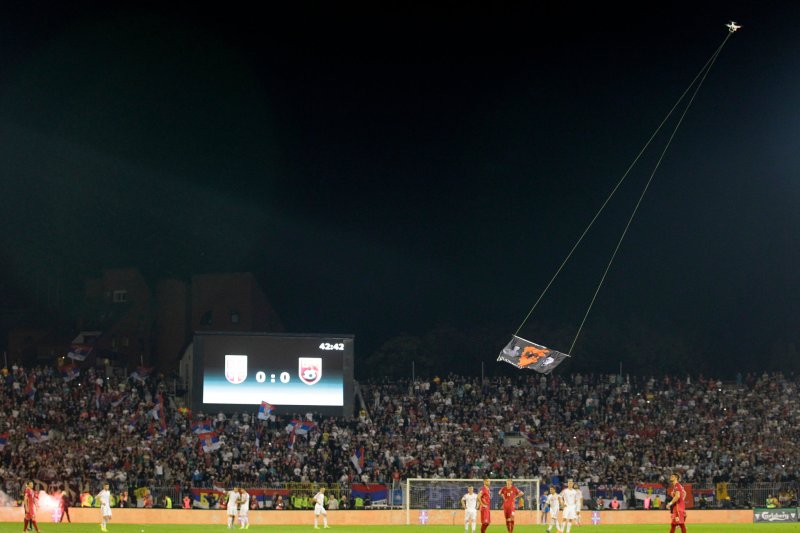Serbia and Albania Move on from ‘Drone’ Game but Tensions Still Simmer
It was far more than a football flashpoint when, on a night in Belgrade that resembled the most vivid fever dream, all hell broke loose in a Euro 2016 qualifier between Serbia and Albania. The “drone” game of October 2014 is notorious and the abiding memory is of Albania’s players fleeing down the tunnel at Partizan Stadium, a tinderbox that had ignited dangerously. It sparked a diplomatic incident, the home country immediately summoning its near neighbour’s ambassador to discuss the chaos wreaked after a “Greater Albania” flag had been lowered over the pitch before half-time. Blame flew in every conceivable direction and it was a case study in how sport can amplify longstanding enmities in visceral, deeply consequential fashion.
Maybe it was a dream after all. On Tuesday Uefa announced that the two countries would co-host its Under-21 Championship in 2027, confirming a decision effectively made last year after Belgium and Turkey withdrew their bids. There is justifiable contentment inside European football’s governing body given the hurdles that needed to be overcome. The line, as repeated by the Albanian FA president and Uefa ExCo vice-president Armand Duka, is that the event will be “a catalyst for breaking down barriers, enhancing mutual understanding and creating a more positive future for the people of Albania and Serbia”.
In truth the bidding process, such as it was, may have been the simple part. It was a surprise when, last May, they announced the joint initiative after Albania were advised a solo bid would not pass. They have the region’s most modern stadium in Tirana’s Arena Kombëtare, which held the Conference League final in 2022, but would have struggled to stage the entire event. Serbia’s unexpected arrival on the scene offered a solution and was encouraged by political figures keen on demonstrating closer ties, not to mention a Uefa leadership keen to foreground football’s role in bridging the unbridgeable. In 2014 the respective FAs had not even managed to agree on details for ticket sales to away fans; now they were in lockstep over sharing a major competition.
Others, though, are not so keen to play happy families. When Duka emphasised in September that “I do not think and have never thought … that organising the European Championship can amnesty what has happened” he was referring, among other historical traumas, to Serbia’s brutal war in the mainly ethnic Albanian Kosovo during the late 1990s. He was responding directly to protests from supporters’ groups, who had made their feelings known when news of the bid emerged.
Members of Tifozat Kuq e Zi, an influential ultras association that claims to number more than 7,000, sprayed red paint outside the FA’s headquarters and displayed photographs relating to atrocities committed in Kosovo. “We oppose any collaboration with the murderers,” read part of a post on social media. In November’s match against Ukraine at Arena Kombëtare, some supporters held up banners condemning the tournament and referring again to war crimes.
Lorik Cana, the Kosovo-born former Albania captain, described the co-hosting plan as “not the proper step”. Although feelings are largely much less strong among Albanians who were not directly touched by the war in Kosovo, and dissent against Euro 2027 has been less pronounced in Serbia, there will remain a concern Uefa is playing with fire until the event has concluded successfully.
It is hardly as if everyone involved has rubbed along nicely since the fateful evening in Belgrade, which was awarded to Albania as a walkover by the court of arbitration for sport. Fans and players of either persuasion continue to give Uefa’s disciplinary chiefs periodic headaches with breaches of conduct involving the other.
Albania were punished for a number of incidents at Euro 2024, including the striker Mirlind Daku’s decision to shout “fuck Serbia” and other nationalist chants down a megaphone after a match with Croatia. Serbia were fined in December after fans tried to set an Albania flag alight at a game against Switzerland. The list could go on and on. Level heads may well prevail but it is hard to think of a European competition in which tensions in the hosts’ orbits have been so fresh.
Any nerves within Uefa will face an acid test during the 2026 World Cup qualifiers. Serbia and Albania were not barred from being paired in draws despite the disgrace of Belgrade; fate has put them back together this time in a group that also contains England, the first meeting taking place in Albania on 7 June before Serbia holds the rematch on 11 October.
(Source: The Guardian)













